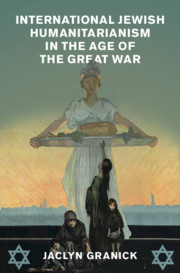‘The Great War was a pivotal moment in the evolution of humanitarian activism. Granick's landmark study breaks new ground by recognizing the central place of Jews and Jewish causes at this critical juncture: it represents essential reading not just for Jewish historians, but for historians of US foreign policy, humanitarian activism and global civil society.'
Abigail Green - author of Moses Montefiore: Jewish Liberator, Imperial Hero
‘Jaclyn Granick's book is a pathbreaking study. Within the growing research on the history of the aid sector's formative period after the First World War it fills an important gap. It will serve as an invaluable reference with regard to the distinct role of American Jewish organizations.'
Daniel Maul - author of The International Labour Organization: 100 Years of Global Social Policy
‘This is a pioneering monograph on global Jewish social policy from the First World War through the 1920s. Granick deftly illustrates the synergy between American-Jewish funders and administrative experts in Europe, their Herculean efforts to assist Jews in war-torn regions, and the challenges they faced as trans-national actors in a world increasingly defined by nation-states.'
Derek Penslar - author of Shylock's Children: Economics and Jewish Identity in Modern Europe
‘Overall, Granick tells an important story that contextualizes the relative positions of European, Palestinian, and American Jewish communities between the world wars … Recommended.’
A. Lieberman Colgan
Source: Choice Magazine
'Jaclyn Granick illustrates how the destruction wreaked by World War I was transformative, not only in the annals of Jewish history, but also in the history of humanitarian activism. Mining archives in places as disparate as New York, Washington, Geneva, Cincinnati, and Jerusalem and sifting through documents in numerous languages, Granick shows how the war and its devastation created 'a long-lasting systemic change across the Jewish world.' This change was wrought by a group of actors, who Granick painstakingly brings to life with her nuanced understanding of archival documents as well as their silences.'
Source: The Jewish Book Council
‘The history and the memory of the Great War, named after its enormous, unsurpassed scale, is often overshadowed by the horrors of the Holocaust. Granick addresses this frequently under-appreciated and overlooked historical event with compelling arguments concerning the (dis)continuity of humanitarian practices … Her innovative study is a powerful account of intricacies and ramifications of the war that mobilized communities all around the world.’
Joanna Zofia Spyra
Source: Jewish History
‘Jaclyn Granick’s meticulous and compelling monograph is an important contribution to contemporary Jewish history and to the international history of World War I and the postwar era … This critical, wide-ranging analysis enables us to think anew about Jewish international humanitarianism during a pivotal decade and to revise our understanding of its reach and effectiveness.’
Carole Fink
Source: American Jewish History
'Granick, in writing of the American ascendancy during and after World War I and, with it, that of American Jews, shows how, among epic political transformations on the world stage, the conflict created both a new type of refugee-one with no home to return to-and a new type of international private relief organization that had to work in concert with governmental agencies … The stories Bemporad, Granick, and Veidlinger tell in their very different books remind us how much our world is an heir to the violent legacy of World War I. Yet they also show, as the war in Ukraine underscores, that perhaps we do not have to be trapped in this past.'
Magda Teter
Source: New York Review of Books
'The book is ambitious and covers a lot of ground, both in terms of territory and the types of programs it considers. By considering the broad range of American Jewish humanitarian work, however, Granick is able to offer readers a deeper understanding of the profound impact of World War I and its often-underappreciated role in reshaping the structures of the Jewish world.'
Jessica Cooperman
Source: Journal of Jewish Identities
‘Spending time with Granick’s Jewish humanitarians has been a thrilling adventure … this beautiful book, a meticulous, essential, and gorgeous cartography of Jewish humanitarianism at the time of the Great War.’
Ilse Josepha Lazaroms
Source: Journal of the Fondazione
‘Jaclyn Granick’s impressively researched study … sheds much light on the politics of relief in this era.’
Eugene M. Avrutin
Source: The Journal of Modern History
‘Granick’s study is … geographically wide-ranging, consistently addresses gender issues, and focuses on unique topics such as food relief, health and medical concerns, children, and credit as a form of reconstruc-tion.’
Shannon L. Fogg
Source: European Journal of Jewish Studies
‘… with its complex narrative yet succinct and lucid conclusions, [the book] has a place in the academic realm. … It will leave readers debating Granick’s ideas of marrying ‘international’ and ‘Diaspora’ within the context of American Jewish participation in humanitarianism and Western imperialism and how the JDC is still in business.’
Sara Halpern
Source: The Journal of the Association for Jewish Studies
‘This is a meticulously researched book, drawing from a wealth of international archives, which sets the story of Jewish humanitarianism into a truly global context. Jaclyn's pioneering study places a new spotlight on the Great War as a tumultuous and devastating episode for European Jewry, but also one which served as a catalyst for the internationalisation of Jewish humanitarian causes and organisations. Perceptive, expansive and transnational in scope, this volume makes a truly significant contribution to modern Jewish history and to the history of the Great War.’
Source: British and Irish Association for Jewish Studies, 2023 Book Prize Judging Panel



